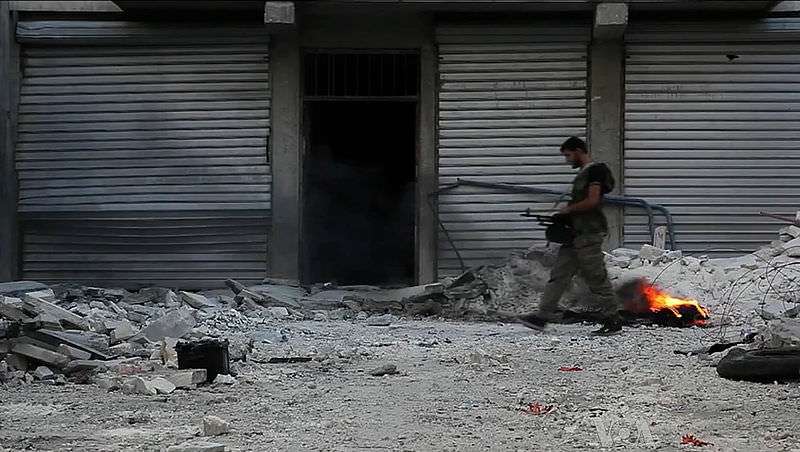The US Should Not Contribute to a Peacekeeping Force in Syria


Michael Doran and Michael O'Hanlon, both of the Brookings Institution, argued yesterday in USA Today that a peace deal for Syria can only be achieved by a multilateral peacekeeping force which must include American troops.
From USA Today:
The fundamental point is this: A peace deal is not feasible under current conditions. It will require greater military effort up front and it will also require, in the end, international peacekeepers to implement it.
Moreover, U.S. troops in modest numbers must be part of that force. No other country has the necessary military enablers and the political clout to provide the glue in a multinational military coalition.
Doran and O'Hanlon are right that the present situation in Syria does not make a peace deal likely. However, this does not mean that multilateral military and peacekeeping missions like the ones Doran and O'Hanlon are arguing for should be undertaken, especially considering that the implementation of Doran and O'Hanlon's recommendations would mean arming some of Assad's opposition:
We can provide not only light arms, but also heavier weaponry and even air support, if necessary. Having established the broader political and military objectives and parameters for our intervention in advance, such steps could be considered without risking all-out war.
What is perhaps most worrying about the op-ed is that Doran and O'Hanlon only mention Al Qaeda once, and do not address what should be done to ensure weapons sent to rebels in Syria will not end up in the hands of Al Qaeda-linked groups like Jabhat al-Nusra. Assad's opposition is not a homogenous group with a single political goal, and were groups like Jabhat al-Nusra to get heavy weapons the level violence in Syria would only get worse.
Doran and O'Hanlon also don't consider that having a peacekeeping force big enough to counter the influence of jihadists, ensure the end of the conflict, and enforce a peace plan in Syria would almost certainly see resentment towards the U.S. increase in the region in the long run, especially among Sunni extremists. While it might be the case that some governments in the region have asked for more American involvement having American peacekeepers patrolling streets in Syria could be seen by many in the Middle East and elsewhere as the latest example of Americans meddling in foreign affairs.
Over at The New York Times Thomas Friedman has outlined what he sees as three strategies regarding Syria, none of which he accepts are particular palatable. Thankfully, Friedman knows that it would take a military intervention similar to what was seen in Iraq to ensure that by the end of the conflict in Syria there is a multisectarian and democratic Syria. Friedman also points out that the rebels that are fighting for democracy are weak, unlike some of the jihadist elements within Assad's opposition.
Friedman also mentions the idea of having international peacekeepers in Syria after mentioning the U.S. response to the situation in Libya in 2011:
In Syria, we would be hoping that, with just small arms, the rebels could at least fight Assad & Friends to a stalemate so the regime would agree to negotiate Assad's departure. Even if by some miracle that were to happen, so much more blood would be spilled along the way that we would still need an international peacekeeping force to referee any post-Assad power-sharing deal. All volunteers, please raise your hand.
Unfortunately for Obama and other western leaders the situation in Syria cannot be treated in the same way as other humanitarian interventions because of its political, ethnic, geographic, and diplomatic conditions. In Syria a tragic but unique situation is unfolding that would not necessarily get better were peacekeepers deployed or heavy weapons sent to rebels.
Editor's Note: As of February 29, 2024, commenting privileges on reason.com posts are limited to Reason Plus subscribers. Past commenters are grandfathered in for a temporary period. Subscribe here to preserve your ability to comment. Your Reason Plus subscription also gives you an ad-free version of reason.com, along with full access to the digital edition and archives of Reason magazine. We request that comments be civil and on-topic. We do not moderate or assume any responsibility for comments, which are owned by the readers who post them. Comments do not represent the views of reason.com or Reason Foundation. We reserve the right to delete any comment and ban commenters for any reason at any time. Comments may only be edited within 5 minutes of posting. Report abuses.
Please to post comments


Shock and awe until we drag Assad out of a spider hole. But this time around, we know we don't even have to go through Congress to do it. Sock and awe, baby!
I don't understand why Libertarians want the terrorists to win. Intervention into other countries is good, unless a Republican is president, because then we can't be ensured that our intentions are good when we're blowing up foreign daycare centers and wedding ceremonies.
But Obama promised that he was just going to put the tip in. He wouldn't renege on that once it's in there would he?
Crap. Two kids came by the house this morning asking for a contribution to a peacekeeping force in Syria. They said it was a good cause, so I gave them a sawbuck.
Do you mean you gave them $10 or a device for holding rough wood?
One or the other, I forget.
Maybe you should get a job and stop laying around the house all day.
I have my device-for-holding-rough-wood business.
Doesn't the term "peacekeeping force" come with the assumption that there is actually peace to keep?
Back before President Wonderful, the U.S. avoided putting the stupid blue hat on our troops and subjecting them to UN command.
Well we do (or did?) have troops in the Sinai to maintain the peace between Israel and Egypt. Of course there was an actual signed peace treaty in place.
And there were some real American interests at stake (keeping the Suez Canal open).
Peace will only break out in Syria when one side or the other achieves victory.
People older than myself are acting like they don't remember the Lebanon mission in 1982-83. How could a Syria mission go any better?